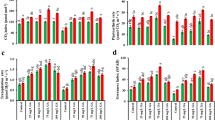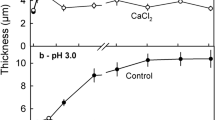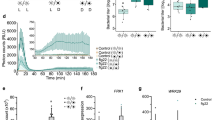Abstract
IN previous communications1–3, I have reported that the increase of sugar content in a plant cell increases its frost hardiness, and that polyhydric alcohols, especially ethylene glycol and glycerol, also show the same protective action as glucose and sucrose against freezing injury in Gardenia leaf cells.
This is a preview of subscription content, access via your institution
Access options
Subscribe to this journal
Receive 51 print issues and online access
$199.00 per year
only $3.90 per issue
Buy this article
- Purchase on Springer Link
- Instant access to full article PDF
Prices may be subject to local taxes which are calculated during checkout
Similar content being viewed by others
References
Sakai, A., Low Temp. Res., Ser. B, 17, 29 (1959).
Sakai, A., Nature, 185, 698 (1960).
Sakai, A., Low Temp. Res., Ser. B, 18, 24 (1960).
Salt, R. W., Canad. J. Zool., 37, 59 (1957).
Salt, R. W., Canad. Entomologist, 89, 491 (1957).
Author information
Authors and Affiliations
Rights and permissions
About this article
Cite this article
SAKAI, A. Effect of Polyhydric Alcohols to Frost Hardiness in Plants. Nature 189, 416–417 (1961). https://doi.org/10.1038/189416a0
Issue Date:
DOI: https://doi.org/10.1038/189416a0
This article is cited by
-
Versatile roles of sorbitol in higher plants: luxury resource, effective defender or something else?
Planta (2022)
-
Seasonal periodicity of physical factors, inorganic nutrients and microalgae in Antarctic fellfields
Polar Biology (2003)
-
Amino acid metabolism in nongrowing environments in higher plants
Amino Acids (1993)
-
Cellular ultra-structure ofFucus vesiculosus frond in summer and winter
Protoplasma (1963)
-
Cold resistance in woody plants
The Botanical Review (1963)
Comments
By submitting a comment you agree to abide by our Terms and Community Guidelines. If you find something abusive or that does not comply with our terms or guidelines please flag it as inappropriate.



